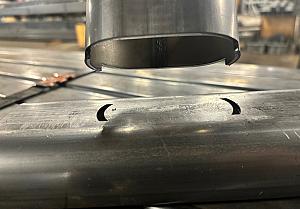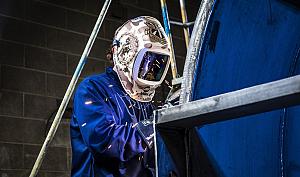Owner, Brown Dog Welding
- FMA
- The Fabricator
- FABTECH
- Canadian Metalworking
Categories
- Additive Manufacturing
- Aluminum Welding
- Arc Welding
- Assembly and Joining
- Automation and Robotics
- Bending and Forming
- Consumables
- Cutting and Weld Prep
- Electric Vehicles
- En Español
- Finishing
- Hydroforming
- Laser Cutting
- Laser Welding
- Machining
- Manufacturing Software
- Materials Handling
- Metals/Materials
- Oxyfuel Cutting
- Plasma Cutting
- Power Tools
- Punching and Other Holemaking
- Roll Forming
- Safety
- Sawing
- Shearing
- Shop Management
- Testing and Measuring
- Tube and Pipe Fabrication
- Tube and Pipe Production
- Waterjet Cutting
Industry Directory
Webcasts
Podcasts
FAB 40
Advertise
Subscribe
Account Login
Search
Nigerian engineering teacher turns to welding
Highly respected professor uses skills as welder to supplement income
- By Josh Welton
- June 3, 2024

Nigerian engineering professor Kabir Abu Bilal earns more income as a weekend welder than he does teaching full time at Ahmadu Bello University. BBC News
Typically, my focus revolves around welders in the United States, and my mindset consistently centers on the worker, their work, and how it integrates into America’s welding industry.
I don’t know a heckuva lot about Nigeria (yet), but I really dig this story from the BBC. Kabir Abu Bilal, or professor Abu Bilal, has been teaching engineering at the highly respected Ahmadu Bello University in Zaria, Nigeria, for nearly 20 years and has published numerous books on physics and electrical engineering.
“Kabir Abu Bilal is not your regular Nigerian university professor—he has a second job as a welder in the northern city of Zaria,” the article stated.
His colleagues were shocked when he opened his own welding shop.
"Society makes us think someone is too big for certain roles, and it's not true,” said fellow professor Yusuf Jubril. "What he is doing is not humiliating but commendable, and I hope others learn from him."
Around the time his teaching career began, Abu Bilal also opened his own modest welding shop. His drive stemmed from the realization that the engineering world, as dictated by his education, was all theory and no dirty hands.
"Unfortunately, I found out engineering here was more theoretically based, and I needed a place to express myself,” he told the BBC.
The professor grew up creating, building, and fixing things with his hands and needed to continue this aspect of his life.
If you think we don’t pay our secondary education teachers much in the states, in Nigeria, the university faculty are paid pennies. It would be the U.S. equivalent of $390 to $555 a month.
So, while other academics mocked him, Abu Bilal welded his way to driving a Mercedes-Benz.
Rather than saying, “I told you so,” when times were tough, he was able to lend a hand instead.
“When university lecturers went on strike for eight months in 2022 and we weren't paid, I always had money because of this job, and a few colleagues came to me for help,” he said in the BBC article.
Remarkably, Abu Bilal has developed and expanded his welding enterprise, taking on ten apprentices (ages 12 to 20), all while ascending the ranks within the university faculty. A skilled trades education shows its true importance when you consider that graduating from university is hardly a surefire way to post-grad employment.
According to Stutern's Nigeria Graduate Report, more than 40% of graduates fail to get a job in Nigeria, Africa's most populous country.
The year-long apprenticeship opportunity offered by Abu Bilal sets up new welders with the skills and knowledge to launch their own businesses.
Not wanting his own children to be “academic snobs,” the 50-year-old professor also brings his own five kids to the shop with him on the weekends and teaches them how to weld.
Pretty dang cool. Much like here in the United States, a job considered “menial” can be a flourishing career for those who find a passion for it.
subscribe now

The Fabricator is North America's leading magazine for the metal forming and fabricating industry. The magazine delivers the news, technical articles, and case histories that enable fabricators to do their jobs more efficiently. The Fabricator has served the industry since 1970.
start your free subscriptionAbout the Author

- Stay connected from anywhere

Easily access valuable industry resources now with full access to the digital edition of The Fabricator.

Easily access valuable industry resources now with full access to the digital edition of The Welder.

Easily access valuable industry resources now with full access to the digital edition of The Tube and Pipe Journal.
- Podcasting
- Podcast:
- The Fabricator Podcast
- Published:
- 06/25/2024
- Running Time:
- 64:35
Matt Brunner, co-founder and co-owner of Manitowoc, Wis.-based Brunner Fabrication joins us to talk about how he transformed...
- Industry Events
Precision Press Brake Certificate Course
- July 31 - August 1, 2024
- Elgin,
Laser Welding Certificate Course
- August 6 - 8, 2024
- Farmington Hills, IL
Golf 4 Manufacturing
- August 19 - 18, 2024
- Waukegan,
The Fabricator's Technology Summit
- August 20 - 21, 2024
- Eglin, IL































